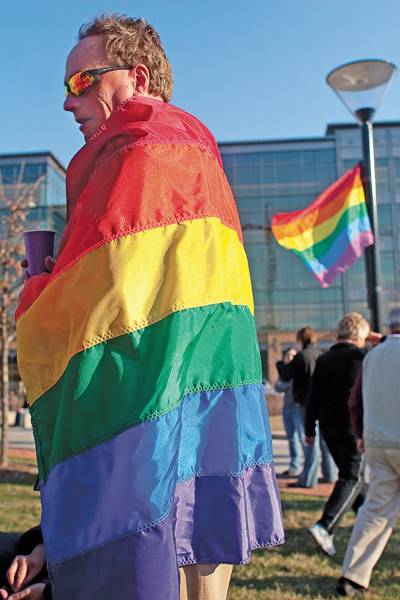Activist groups will ‘not be welcomed’

Gary Kaufman, of Des Moines, uses a rainbow-colored flag as a coat Friday April 3, 2009 during the OneIowa rally in the Western Gateway Park in Des Moines. Photo: Rashah McChesney/Iowa State Daily
October 7, 2009
With economic issues and state funding concerns casting a long shadow over Iowa, the issue of gay marriage faces an uncertain future in the 2010 elections.
A Constitutional amendment to ban gay marriage in Iowa was unsuccessful in 1994 said State Senator Herman Quirmbach. With the Republicans now a minority party in Iowa, gay marriage is a social issue able to attract voters to the party.
Jason Covey, chair of the Iowa State College Republicans and junior in political science, said the club would not be taking action specifically on the gay marriage issue. The club’s focus is on getting candidates elected.
Covey did say, however, that Republican candidates in Iowa are focusing on voting out the three justices up for retention election who ruled in favor of the Constitutional amendment legalizing gay marriage. Covey said that the central reason for ousting the judges is that they created a law rather than interpret it and thus overstepped their boundaries.
Covey said many Republicans do not support the law due to legal confusion that has resulted from the legalization of gay marriage. This is due to the fact that all Iowa marriage laws are coded for heterosexual marriage. Covey said the confusion will cost the state extra money in court processes and lead to legal headaches.
In the past, political activist organizations outside the state have entered Iowa elections and run advertisments on gay marriage. Covey said that these groups dilute candidates and may alienate potential voters and thus will not be welcomed into the 2010 campaigns.
The spectre of outside influence still hangs over the 2010 election. In a special election on Sept. 1 in Iowa’s House District 90 between Stephen Burgmeier, R-Jefferson and Curt Hanson, D-Jefferson, the National Organization for Marriage spent $86,000 to elect Burgmeier. Burgmeier did not win, but the National Organization for Marriage, based in Washington D.C., vowed to remain active in the 2010 Iowa elections with its Reclaim Iowa Project, according to the National Organization for Marriage’s Web site.
Rev. Brian Eslinger of the Universalist Unitarian Fellowship of Ames said he believes there will again be outside influence on both sides. Eslinger has seen the interest groups stir up what he believed were plays to people’s basic instincts.
“I hope it can be a fruitful and civil discussion,” Eslinger said of the upcoming election. Eslinger said the issue is best handled when it focuses on how our civil society can support families of all types.
Eslinger said that in the past the issue has played to the illogical fears of people or threats that clergy would be sued if they did not marry same-sex couples, though these insinuations are completely false. Eslinger said he sees the fear rhetoric starting again, but said he hopes the people of Iowa will stay open-minded.
Rev. Paul Johnson, of the United Church of Christ, preforms ceremonies for same-sex couples. Johnson was married to his same-sex husband as of May 31. Johnson said that gay marriage is not the dicisive issue many conservatives believe it is.
Support of gay marriage is likely to increase in the future, Johnson continued.
“One of the things that is going to make a difference is friends and family members who are getting married” and dispelling stereotypes of gay couples, Johnson said.
Johnson said he hoped that by the time the issue of gay marriage comes to a vote the public will have more support for the issue. Johnson said that its important to remember that there is only marriage, equal in the eyes of the law and reflected in the new marriage applications that do not require gender identification.
“This is not about the religious definition of marriage, it’s about civil marriage,” Johnson said. Civil matters are separate from faith and churches not wishing to endorse the state law may refuse to preform same-sex ceremonies.
Johnson also said it is important to understand arguments that same-sex couples have detrimental effects on children do not take into account the fact that same-sex couples have raised children since before gay marriage was legal. Gay couples do not have accidental children, Johnson said.
Both Johnson and Eslinger recommended the One Iowa organization to students who seek involvement with the issue. The organization hosts volunteer opportunities and activism events.
Quirmbach, said he believed the Iowa Republican party would try to “flog the issue without success” in regards to gay marriage. No Democrat voting against the gay marriage ban in 1994 has ever lost an election, while 11 state senate Republicans have lost while opposing gay marriage.
Quirmbach said many in Iowa may be uncomfortable with gay marriage but will still accept it. “Changing the constitution to take away people’s rights is something we’ve never done in this state,” he continued.
Quirmbach said that most young people do not care about gay marriage and are more focused on things like debt and health care. He also mentioned the failed attempt in the District 90 special election and said there may even be backlash if outside groups attempt to get involved again.
Republican gubernatorial candidate Bob Vander Plaats has made a promise on his Web site to support a stay on gay marriages until the general assembly rewrites Iowa law or “Iowans are allowed to vote on the definition of marriage as one man and one woman.” The role of gay marriage in the elections will not become clear until later in the election cycle.
















